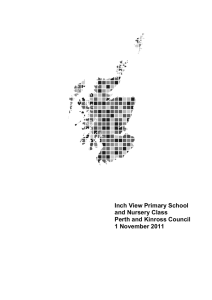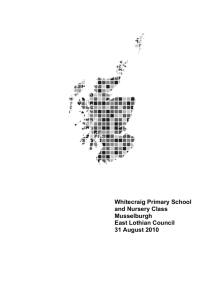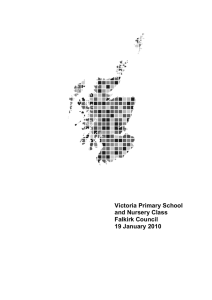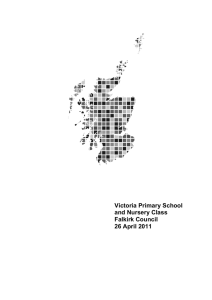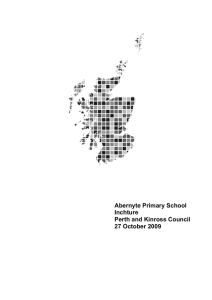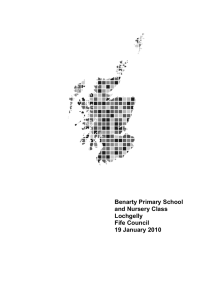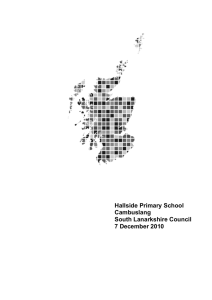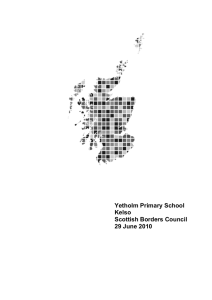Antonine Primary School and Nursery Class Bonnybridge
advertisement
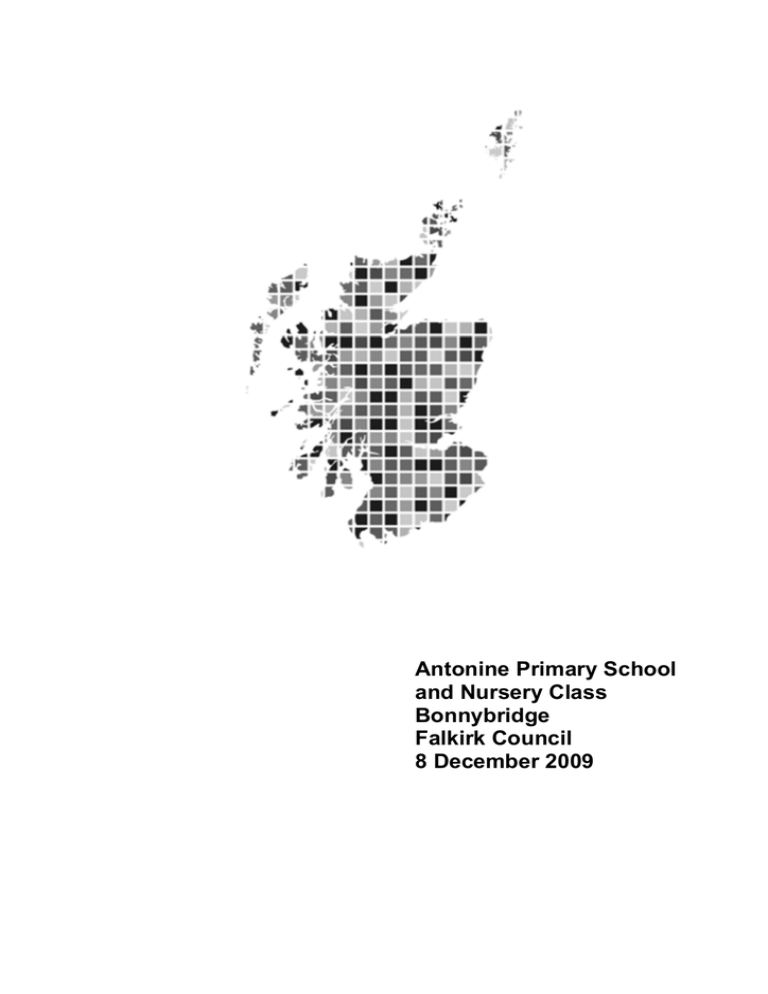
Antonine Primary School and Nursery Class Bonnybridge Falkirk Council 8 December 2009 HM Inspectorate of Education (HMIE) inspects schools in order to let parents1, children and the local community know whether their school2 provides a good education. Inspectors also discuss with school staff how they can improve the quality of education. At the beginning of the inspection, we ask the headteacher and staff about the strengths of the school, what needs to improve, and how they know. We use the information they give us to help us plan what we are going to look at. During the inspection, we go into classes and join other activities in which children are involved. We also gather the views of children, parents, staff and members of the local community. We find their views very helpful and use them together with the other information we have collected to arrive at our view of the quality of education. This report tells you what we found during the inspection and the quality of education in the school. We describe how well children are doing, how good the school is at helping them to learn and how well it cares for them. We comment on how well staff, parents and children work together and how they go about improving the school. We also comment on how well the school works with other groups in the community, including services which support children. Finally, we focus on how well the school is led and how staff help the school achieve its aims. If you would like to learn more about our inspection of the school, please visit www.hmie.gov.uk. Here you can find analyses of questionnaire returns from children, parents and staff. We will not provide questionnaire analyses where the numbers of returns are so small that they could identify individuals. Where applicable, you will also be able to find descriptions of good practice in the school. 1 Throughout this report, the term ‘parents’ should be taken to include foster carers, residential care staff and carers who are relatives or friends. 2 The term ‘school’ includes the nursery class or classes where appropriate. Contents 1. The school 2. Particular strengths of the school 3. How well do children learn and achieve? 4. How well do staff work with others to support children’s learning? 5. Are staff and children actively involved in improving their school community? 6. Does the school have high expectations of all children? 7. Does the school have a clear sense of direction? 8. What happens next? 1. The school Antonine Primary School is a non-denominational school with a nursery class. It serves part of the town of Bonnybridge. The roll was 234, including 48 in the nursery when the inspection was carried out in October 2009. Children’s attendance was in line with the national average in 2007/2008. There have been significant changes in staffing over the past three years. 1 2. Particular strengths of the school • Children’s learning experiences in the nursery class. • Children’s attainment in mathematics. • The positive start made to engaging children actively in their learning. • Teamwork of staff and their commitment to improving the school, led by the headteacher. 3. How well do children learn and achieve? Learning and achievement Children in the nursery class are gaining a high level of success in their learning. They enjoy choosing their own play activities. Almost all children concentrate well on their chosen activity. Staff now need to involve children in deciding on what they need to learn next. Across the primary classes, children are motivated and eager to learn. Children are actively involved in aspects of their learning, for example in literacy activities and through group work. They are developing good skills in working with others. Children do not always know their strengths as learners or what they need to do to improve. Children extend their learning using the outdoor classroom. Across the school, children make good use of computers to help them learn. In the nursery class, children are developing friendships and are learning to share and take turns. They are becoming more independent as they learn to look after themselves. Children interact very well with each other in play situations. They are confident discussing what they are doing with adults. In the primary classes, children achieve widely, through a broad range of experiences. 2 Children at all stages are developing good knowledge about the world of work through enterprise activities and a special focus week. They are beginning to develop as responsible, global citizens through fundraising projects and links with schools in other countries. Children understand the importance of eating healthily and improving the environment. A recent campaign to clean-up the local environment was very successful and attracted national interest. Upper primary children won an award for work done to promote anti-sectarianism in partnership with another local school. Children are developing good skills in physical education, music and art and design. Overall, children throughout the school are achieving very well. In the nursery class, most children are making very good progress in early mathematics and early language. Children listen well in group situations. Most children have a very good awareness of letter shapes and sounds. A few recognise letters in print and match them to letters in their names. Most children count confidently within ten. They use mathematical language very well to compare different weights and heights. Children need to continue to develop problem solving skills. In the primary classes, the school has improved standards in English language and mathematics over the past three years. Most children are making good progress in reading, writing, listening and talking and very good progress in mathematics. Overall, the majority of children achieve national levels earlier than expected. In English language, most children listen well and respond appropriately to instructions. They talk confidently to share ideas, opinions or information. Most children read well for a variety of purposes. Children use their writing skills to express themselves well across the curriculum. They have a good knowledge of spelling, grammar and punctuation. In mathematics, most children are confident and accurate when completing written and mental calculations. Children can collect, organise and present data very well. Across the school, they have a very good understanding of shape, position and movement and in using technology well to extend their learning. Children make very good use of a range of strategies to solve mathematical problems. 3 Curriculum and meeting learning needs The school is developing the curriculum in line with Curriculum for Excellence. In the nursery class, children experience a wide range of activities which support all areas of their learning and development. Staff have worked well to develop children’s knowledge and understanding of early literacy and early numeracy. They also provide opportunities for children to learn about keeping themselves safe and healthy. The curriculum is enriched with good opportunities for outdoor play. In the primary classes, staff provide children with a good range of activities across the curriculum. Children’s health and wellbeing is promoted well through a programme which builds children’s confidence and helps them to manage emotions positively. In taking forward Curriculum for Excellence, staff should ensure progression in all areas of children’s learning. Staff plan a good range of opportunities for children to use their literacy and numeracy skills. Children’s learning is enhanced by outings, visitors to the school and visiting specialist teachers. They would benefit from more out-of-class learning opportunities. Children are not yet benefiting from two hours of high-quality physical education per week. In the nursery class, children’s learning needs are very well met. Staff know children very well and are sensitive to their individual needs. Appropriate procedures are in place for children who require additional support in their learning. Their individual targets are met successfully through their daily routines and activities. Across the primary classes, tasks and activities are at the right level of difficulty for most children. Staff share the purpose of lessons and use questions well to check children’s understanding. The school has effective approaches for identifying, monitoring and supporting children with additional learning needs. The support for learning teacher provides well-planned assistance to children in classes. Clear targets within individualised educational programmes (IEPs) help children to make progress in their learning. The school is planning to involve children, parents and teachers more in setting and reviewing IEP targets on a regular basis. Support assistants work effectively with children to help them with their 4 learning. Homework is given regularly and staff have begun to provide more varied and challenging activities. 4. How well do staff work with others to support children’s learning? The school works well with a range of agencies to support children’s learning. Staff have significantly increased opportunities for parents to support and improve their children’s learning. Some parents work with staff to plan and lead exciting activities, for example, baking and gardening. During the ‘meet the teacher’ event, parents and teachers discuss plans for the year ahead. The Parent Council and parent teacher association are very supportive of the school. They help to organise events and open evenings. Some parents would like more information about their child’s progress. Annual reports to parents need to give more information about children’s progress. The school has begun to develop links with local employers through ‘world of work’ week. Children are well supported when they move from nursery into P1. Very useful information is gathered about children’s progress. Staff in P1 need to make full use of this when planning children’s learning. Staff are working together to improve arrangements when children transfer from P7 to S1 at Denny High School. The school is good at sorting out any concerns and complaints. 5. Are staff and children actively involved in improving their school community? Children take on important roles to improve the school. For example, pupil councillors worked with staff to develop a new house system. The headteacher has significantly increased the active engagement of staff in improving the school. She has successfully supported a large number of new staff. There is a strong sense of teamwork and staff work together well to try out new ideas and share practice, which has improved children’s learning. The headteacher makes good use of the 5 interests and skills of individual staff, encouraging them to lead improvement projects. Staff are committed to improving the school. The school has identified the need to develop further approaches to improving the school, including giving children more responsibility for improving their school community. Staff are aware of the need to track children’s progress regularly and thoroughly, to continue to raise attainment and meet learning needs fully. 6. Does the school have high expectations of all children? The school is welcoming and almost all children enjoy learning at school. The headteacher and staff have successfully raised expectations of children’s attainment. Overall, there are positive relationships between staff, children, parents and partners. Staff are confident about procedures to keep children safe. Achievements are celebrated well through assemblies and award certificates. Some aspects of equality and diversity are promoted well. Staff should continue to develop this across the curriculum. Overall, the school deals effectively with incidents of bullying. A few parents and children are not clear about this. Staff should raise awareness of their anti-bullying approaches. Senior leaders have recently taken steps to improve expectations of children’s behaviour when they move around the school. The school has appropriate arrangements in place for religious observance. Aspects of the accommodation and facilities need to be improved. 7. Does the school have a clear sense of direction? During her three years in post, the headteacher has improved ways in which the school works with parents. She has led staff well to improve learning through teamwork. This has led to better outcomes for children. The headteacher has gained the trust, support and respect of staff and parents. She now needs to give staff clear advice on how to improve the curriculum further. The headteacher is well supported by the depute headteacher and principal teacher. Staff have recently 6 updated the school mission statement and need to use this throughout the life and work of the school. With the leadership of the headteacher and the continued commitment of all staff, the school is well placed to improve further. 9. What happens next? We are confident that, with support from the education authority, the school will be able to make the necessary improvements in light of the inspection findings. As a result, we will make no more visits in connection with this inspection. The school and the education authority will inform parents about the school's progress in improving the quality of education. We have agreed the following areas for improvement with the school and education authority. • Continue to give children more responsibility for their own learning, helping them to understand their strengths, progress and next steps as learners. • Make better use of information about children’s progress and develop further approaches to improving the school. At the last Care Commission inspection of the nursery class there were no requirements. In addition, two recommendations were made, one of which had been addressed. 7 Quality indicators help schools and nursery classes, education authorities and inspectors to judge what is good and what needs to be improved in the work of a school and a nursery class. You can find these quality indicators in the HMIE publications How good is our school? and The Child at the Centre. Following the inspection of each school, the Scottish Government gathers evaluations of three important quality indicators to keep track of how well all Scottish schools and nursery classes are doing. Here are the evaluations for Antonine Primary School and Nursery Class. Primary school Improvements in performance Learners’ experiences Meeting learning needs very good good good Nursery class Improvements in performance Children’s experiences Meeting learning needs very good very good very good We also evaluated the following aspects of the work of the school and nursery class. The curriculum Improvement through self-evaluation HM Inspector: Graeme Logan 8 December 2009 8 good good When we write reports, we use the following word scale so that our readers can see clearly what our judgments mean. excellent very good good means means means satisfactory weak unsatisfactory means means means outstanding, sector leading major strengths important strengths with some areas for improvement strengths just outweigh weaknesses important weaknesses major weaknesses If you would like to find out more about our inspections or get an electronic copy of this report, please go to www.hmie.gov.uk. Please contact us if you want to know how to get the report in a different format, for example, in a translation, or if you wish to comment about any aspect of our inspections. You can contact us at HMIEenquiries@hmie.gsi.gov.uk or write to us at BMCT, HM Inspectorate of Education, Denholm House, Almondvale Business Park, Almondvale Way, Livingston EH54 6GA. Text phone users can contact us on 01506 600 236. This is a service for deaf users. Please do not use this number for voice calls as the line will not connect you to a member of staff. You can find our complaints procedure on our website www.hmie.gov.uk or alternatively you can contact our Complaints Manager, at the address above or by telephoning 01506 600259. Where the school has a nursery class, you can contact the Complaints Coordinator, Headquarters, Care Commission, Compass House, Riverside Drive, Dundee DD1 4NY, telephone 0845 603 0890. Crown Copyright 2009 HM Inspectorate of Education
